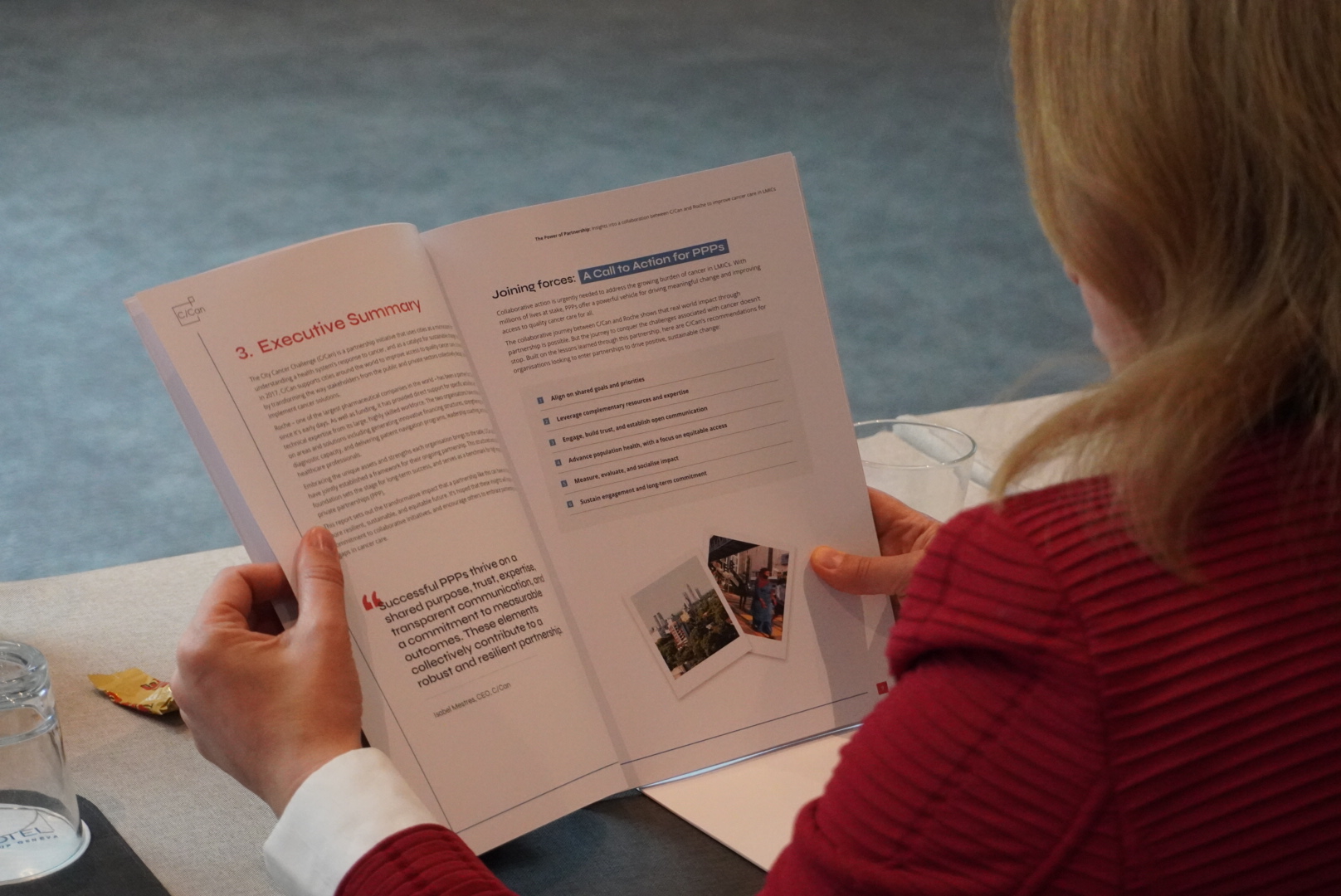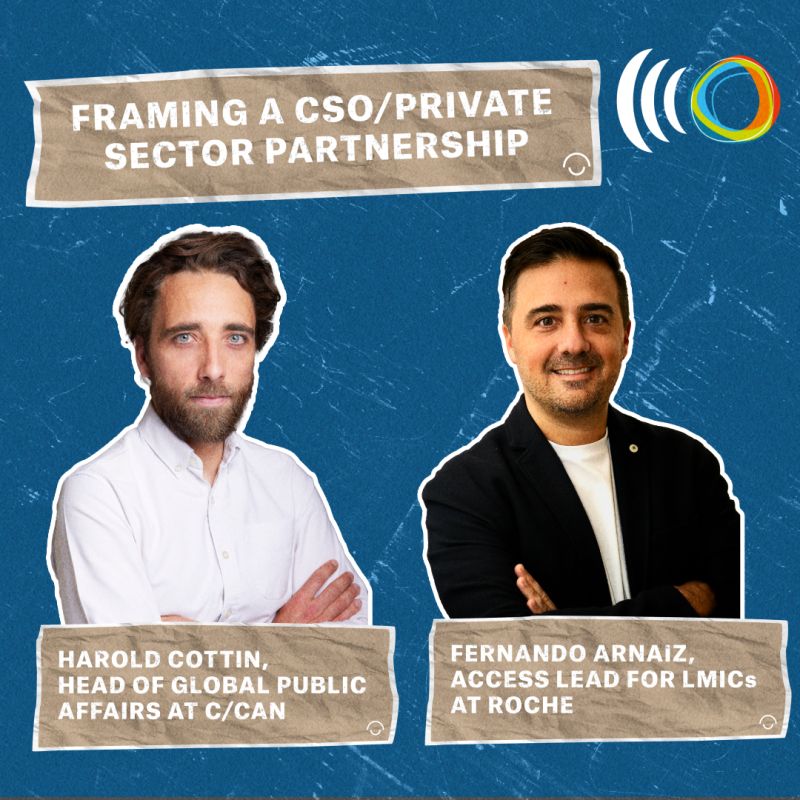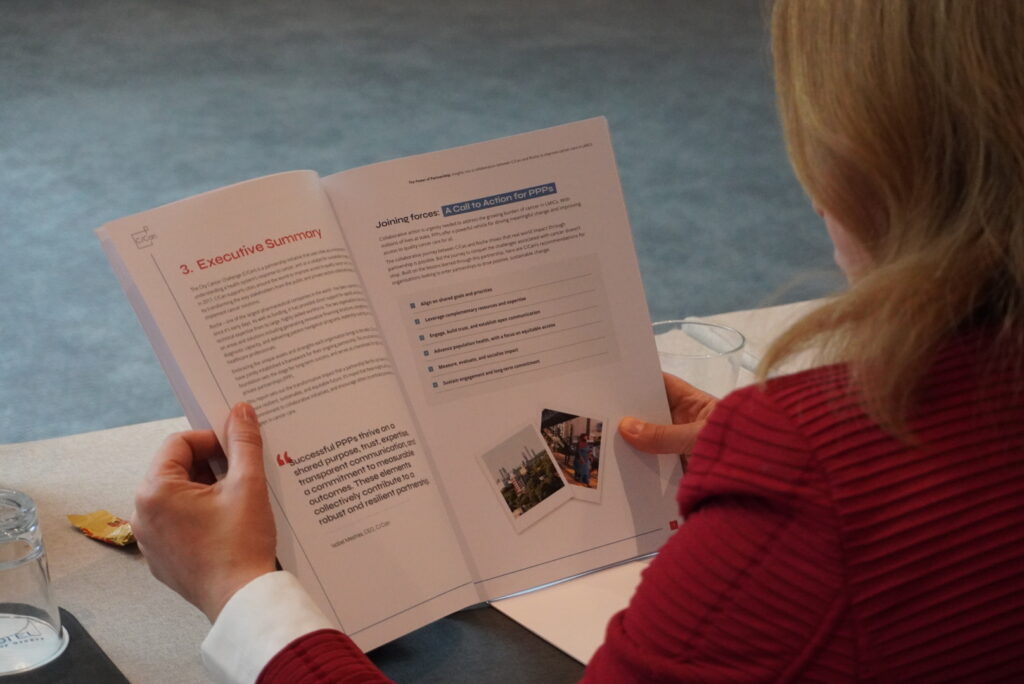
In a time when global health funding is increasingly constrained, finding effective and sustainable ways to collaborate across sectors has never been more urgent. At City Cancer Challenge (C/Can), we’ve long believed that local leadership, long-term partnerships, and system-level change are key to transforming cancer care and strengthening healthcare systems in low- and middle-income countries (LMICs). But how do you structure a successful partnership between a mid-size NGO and a multinational pharmaceutical company, one that respects and responds to local needs, engages diverse stakeholders, and delivers real impact?
That’s the focus of a recent conversation between Harold Cottin, Head of Public Affairs at C/Can and Fernando Arnaiz, Access Lead for LMICs at Roche, in Voices of the Health Revolution podcast series where they reflect on the evolution of their collaboration and how it led to the creation of a practical tool now available to others: the Collaboration Framework.

Though originally intended to guide their own partnership, the framework quickly evolved into a pragmatic tool available for any organisation seeking to build effective cross-sector partnerships. In a space where there is a limited number of models available for private sector engagement in public health interventions, it now supports stakeholders from different sectors in shaping effective partnerships.
You can listen to the full episode here.
From Experience to Framework
After years of working together in cities across LMICs, C/Can and Roche paused to reflect on the successes and failures of their collaboration, and the key learnings that could be shared with the Global Health community. With the support of external experts, they co-developed a Collaboration Framework based on the best practices from their partnership, applicable not only in cancer care but across the health sector and beyond. This framework sets common objectives, rules of engagement, roles and responsibilities and outlines how partnerships can be maximised for both parties across sectors, navigate conflicts of interest and most importantly, deliver impact and better health outcomes. It is a model that provides incentives for all parties involved to avoid short-term gains at the expense of sustainable long-term impact.
With Roche, the collaboration goes beyond visibility and awareness. There is a shared belief in the value of community-led projects to strengthen healthcare systems and achieve better health outcomes,
Harold Cottin, Head of Global Public Affairs, C/Can.
Why It Matters Now More Than Ever
As economic pressures reshape global development funding, this collaboration template can help small & local NGOs to engage in meaningful partnerships with donors from the private sector. It can also contribute to ensure cross-sector collaborations remain driven by local stakeholder needs, in a context where there’s an increasing risk that only projects with clear returns on investment will be prioritised often through top-down approaches.
Every organisation will need to show that their partnerships actually work. The framework enables organisations to collect data and build evidence to demonstrate that the work they are doing makes sense,
Fernando Arnaiz, Access Lead for LMICs, Roche.
By enabling evidence-building and strengthening accountability, the Collaboration Framework helps demonstrate that cross-sector partnerships bring measurable value to both governments and the private sector.
A Tool for Change
Available freely on the C/Can website, the framework includes:
- A shared vision and objectives
- Clearly defined roles and responsibilities
- A Monitoring and Evaluation (M&E) reporting framework
- Communications plans
- Onboarding, partner communication and technical support
- A governance structure and dedicated resources

The report, The Power of Partnership: Insights into a collaboration between C/Can and Roche to improve cancer care in LMICs, published in May 2024 gives additional insights on C/Can and Roche’s approach to develop the Collaboration Framework.
Additionally, the model was selected as a best practice in a recent World Economic Forum (WEF) White Paper Closing Health Gaps through Collaborative Action – A Guide to Impactful Place-Based Change, reinforcing its value in driving impact at local level through multistakeholder coalitions.
Looking Ahead: Building Resilience Through Collaboration
Creating sustainable impact requires long-term partnerships. That’s the lesson from C/Can and Roche’s collaboration: meaningful change, like health system strengthening, takes time and must be driven by more than commercial goals.
Partnership is an art, not a science.
Fernando Arnaiz, Access Lead for LMICs, Roche.
Amongst others, C/Can’s partnership with Roche – anchored in city-identified needs and built on a multi-year commitment – was instrumental in enabling C/Can to develop, test and refine its cross-sector collaboration and City Engagement Process Framework. This partnership supported the foundations for C/Can’s work across 15 cities where – to date – C/Can’s has actively supported 5,542 health workers, pioneering the development of 133 unique cancer care solutions that have impacted health systems to reach over 67.5 million people and over 950,000 patients across the C/Can network cities. Building on this momentum, from 2025 onward, C/Can is entering a new phase: onboarding new cities, supporting sustainable transitions and launching new project cycles.
By sharing what we’ve learned and offering tools that others can adapt, we hope to support a new wave of local, cross-sector collaborations that turn innovation into action.
Don’t forget to listen to the episode now!





